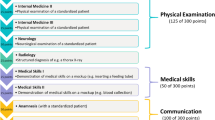Abstract
The purpose of this study was to provide data concerning the relationship between features of residency training and a test of cognitive achievement gathered at the end of residency. To accomplish this, data collected in the late 1970s by three national organizations were joined and analyzed with the aid of experts in internal medicine. Although graduate medical education has evolved since this information was gathered, it does provide a baseline for assessing the impact of changes on the cognitive skills of residents. The findings suggest that better program performance on the examination is associated with attracting more knowledgeable residents to begin with and that programs are able to maintain the advantage of their residents throughout training. Moreover, program characteristics have an impact on the cognitive skills of residents over and above what would be predicted by test scores at the end of medical school. Programs with better examination performance tend to provide residents an extensive, well-supervised educational experience stressing ambulatory care.
Similar content being viewed by others
References
orPanel on the General Professional Education of the Physician and College Preparation for Medicine. Physicians for the twenty-first century: the GPEP report. Washington, DC: Association of American Medical Colleges
Lipkin M, Quill TE, Napodano RJ. The medical interview: a core curriculum for residencies in internal medicine. An Intern Med 1984;100:277–84
Eisenberg JM. Curricula and organization of primary care residencies in internal medicine. J Med Educ 1980;55:345–53
Griner PF. Training of the general internist, different approaches. Arch Intern Med 1977;137:1291–8
Tarlov AR, Schleiter MK, Weil PA. The Association of Professors of Medicine Task Force on Manpower. National study of internal medicine manpower: IV. Residency and fellowship training 1977–1978 and 1978–1979. Ann Intern Med 1979;91:295–300
Napodano RJ, Young LE. The University of Rochester Associated Hospitals Program in Internal Medicine: seven years experience with an innovative city-wide residency for preparation of general internists. Am J Med 1982;72:945–50
Weil PA, Schleiter MK, Tarlov AR. National Study of Internal Medicine Manpower: II. A typology of residency training programs in internal medicine. Ann Intern Med 1978;89:702–15
Napodano RJ, Schuster BL, Krackov SK, Young LE, Griner PF, Pratt R. Use of private offices in education of residents in internal medicine. Arch Intern Med 1984;144:303–5
Rudd P, Tul V, Brown K, Davidson SM, Bostwick GJ. A general medicine clinic: the dilemma and teaching implications. J Med Educ 1979;54:766–74
Weinholtz D, Freeman RM, Waickman LA. Factors influencing teaching during attending rounds. Prof Educ Res N 1986;7:3–4
Norcini JJ, Lipner RS, Benson JA, Webster GD. An analysis of the knowledge base of practicing internists as measured by the 1980 recertification examination. Ann Intern Med 1985;102:385–9
Ramsey PG. Assessment of the clinical competence of practicing internists. Final Report to the American Board of Internal Medicine, 1986
Tarlov AR, Weil PA, Schleiter MK. The Association of Professors of Medicine Task Force on Manpower. National Study of Internal Medicine Manpower: I. Residency training 1976–1977. Ann Intern Med 1978;88:413–20
Weil PA, Schleiter MK, Tarlov AR. National Study of Internal Medicine Manpower: V. Comparison of residents in internal medicine—future generalists and subspecialists. Ann Intern Med 1981;94:678–90
Bell RM. Medical school and physician performance: predicting scores on the American Board of Internal Medicine written examination. Santa Monica, CA: Rand Corporation, 1977
Norcini JJ, Shea JA, Webster GD, Benson JA. Predictors of the performance of foreign medical graduates on the 1982 certifying examination in internal medicine. JAMA 1986;256:3367–70
Schumacher CF. Validation of the American Board of Internal Medicine written examination. Ann Intern Med 1973;78:131–5
Norcini JJ, Lipner RS, Steel KS. The performance of candidates on the geriatric medicine items of the American Board of Internal Medicine certifying examination. J Am Geriatr Soc 1985;33:779–80
Norcini JJ, Swanson DB, Grosso LJ, Shea JA, Webster GD. A comparison of knowledge, synthesis, and clinical judgment multiple choice questions in the assessment of physician competence. Eval and the Health Prof 1984;7:485–99
Council on General Internal Medicine, American Board of Internal Medicine. Attributes of the general internist and recommendations for training. Ann Intern Med 1977;86:472–3
Katz LA. The changing health care system and its effects on medical education. Prof Educ Res N 1986;7:3–5
Author information
Authors and Affiliations
Additional information
Received from the American Board of Internal Medicine, Philadelphia, Pennsylvania.
Supported by The American Board of Internal Medicine. This report does not necessarily reflect the opinions or policies of the American Board of Internal Medicine.
Rights and permissions
About this article
Cite this article
Norcini, J.J., Grosso, L.J., Shea, J.A. et al. The relationship between features of residency training and ABIM certifying examination performance. J Gen Intern Med 2, 330–336 (1987). https://doi.org/10.1007/BF02596169
Issue Date:
DOI: https://doi.org/10.1007/BF02596169



